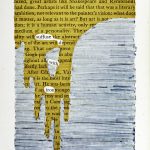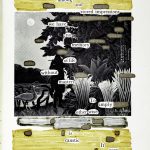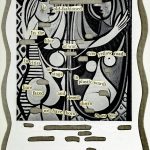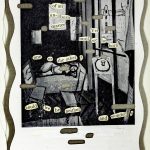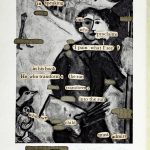My mother calls to tell me she cannot get on the plane. She has had a premonition.
“You’re going to crash?” I sit upright in bed, sheet clutched to my chest. When she says stuff like this, my skin gets crawly.
“Not exactly a premonition.” She sighs. “I can’t say what will happen. A foreboding. Emmy, I’m not thinking straight. I can’t zip up my suitcase. And I wanted to get out of here so badly.”
“Are you sure it’s the plane?” I look to my left where the baby is sleeping in her bassinet. I look to the right where my husband is sleeping in our bed. “Could you be foreboding something else?” I say as I tiptoe out of the room, which is not actually a room. We put up a wall in the studio after the baby was born.
No, says my mother, she’s sure it’s the plane, and of course, I could try to reason with her. I could tell her to go ahead and pack that suitcase, get in a taxi, buy a tea and sit at the airport, see if the foreboding recedes. Until she’s actually on the plane, she has not committed to anything. Instead, I say, “I don’t know what to tell you.” Because really, what should I tell her to do? Get on the plane and then the plane crashes and then she’s gone and then it’s my fault? Because planes do crash. They do.
In the background, at my mother’s house, radio voices are murmuring. “I have to think,” she says. “I’ll call you back.”
—
As soon as I hang up the phone, the baby is up. By up, I mean that she’s screaming. She’s always screaming and we don’t know why. I don’t know why. My husband comes out of the bedroom and hands her to me. “I have to go,” he says.
“It’s six thirty in the morning.” I follow him into the bathroom. He’s a real estate broker, which means that he works on commission, which means that the more he works the more money he makes, at least in theory. I’m no longer sure I buy this direct correlation. He works seven days a week. Before we had a baby, this wasn’t a problem. But now we do have a baby.
I sit on the toilet, bouncing the baby in my lap, while my husband brushes his teeth. “My mother might not be coming,” I say.
He spits into the sink. “Is she sick?”
“Sick in the head!” I say. “You’d think she’d want to see Eva. Who wouldn’t want to spend time with this delightful creature?” I kiss the top of Eva’s head, which is covered in the silkiest hair, soft and ticklish on my lips. She smells like a baby, like white soap and milk. She likes to be bounced, likes the sound of the water and the echo of our voices in the tiny chamber of the bathroom. She and I spend a lot of time in this bathroom. On the rare occasions when she is content and awake, I adore her so much I want to stuff her whole hand in my mouth. Both hands at once.
My husband is sliding the stroller out of the way to get to the door when my mother calls me back. “I’m in line at security,” she says.
“What changed your mind?”
“I’m a fifty-four-year-old woman. I cannot live my life in fear.”
—
I spy her on my building’s doorstep, from four stories up. She is covered chin to foot in a camel-colored, fur-trimmed coat. Her bright blond hair spills over the collar. Since the divorce, she has made herself thin and sort of glamorous.
She is also late. More than two hours late. Thirty minutes ago she called from a taxi to say she was on her way but couldn’t talk. Before that, I was very worried. Fear gnawed my stomach from the inside out. I called the airline. The plane had landed safely, on time. So if something had happened, it had happened only to my mother. Baby in my arms, growing heavier by the minute, I paced the apartment. What had she been foreboding? A car accident? A fainting spell?
“I met the pilot,” she says, over coffee, at the cafe around the corner, Broadway and 100, where we have settled ourselves at a cozy table. The baby is asleep in her stroller and I am actually drinking my coffee, my guard down, more relaxed than I’ve felt in weeks. If I need to use the bathroom, my mother can stay with the baby. If the baby wakes unexpectedly, perhaps she can even hold the baby.
“He’s a very nice pilot.” She pauses. “He’s not actually a pilot.”
“What is he?”
“He’s a flight attendant.”
“How did you meet a flight attendant?” I say, pleased by the inanity, the frivolity of this conversation. Really, I am pleased to be having any conversation. I am so happy my mother is here and I am not sitting alone.
“It’s a long story,” she says. “But when I called you from a taxi, it wasn’t really a taxi.”
“What was it?” I say, stupidly, my brain dulled by motherhood, perhaps, which is what happens to you, they say.
“He keeps his car at the airport. He was kind enough to give me a ride.”
“If he gave you a ride, you should have been early. Or at least, not two hours late.” I pause, comprehension forming. “What did you do in his car? Mom?”
“Oh my goodness, nothing like that!” My mother flushes. “But he was very nice. We had a wonderful conversation.”
“That’s great,” I say and I mean it and I would ask for more details, such as whether she’s planning to see him again, but the baby is starting to stir. I watch her like I’m watching a bomb about to explode. Except, if a bomb were about to explode, I’d run. My mother is distracted. She hasn’t noticed yet. I stand from the table. “I’ll be right back. Could you watch her?” I don’t look back.
—
The last time my mother came to visit, I was very pregnant and my mother was the thinnest I’d ever seen her. She was on a mission. According to her surgeon, you were not supposed to touch your face until you had achieved your ideal weight. This was the reason she hadn’t gotten a mini-facelift years ago. For years, she was a slave to her daily pint of pecan ice cream, until, one day, she wasn’t. One day she realized she could live and thrive on little more than lettuce.
“Don’t lose any more weight,” I told her. “You’re thin enough.”
My mother patted my shoulder. “Don’t take this personally, honey, but your perspective might be a little skewed.” She was very concerned for me and how unwieldy I must feel, how uncomfortable I must be in my swollen body. But I thought I looked fine, maybe better than I’d ever looked. I’d asked her to wait a month before visiting so she could be in town for the birth, but she said she could not push off her trip because she needed to schedule her surgery before the doctor’s schedule was full and she really wanted to get my feedback before she made her final decision. There were so many options, she said—facelift, brow lift, botox. “We could Skype,” I said but she shot that down quickly. She needed me to see her in person, the texture of her skin, the full 360 degrees.
She had not been to the city in a while, since before the divorce. Like a flower, you could see her drinking in the energy; you could see her bloom. Smohio, Ohio, she said, she loved everything about the city, the noise and the streets and the interesting little apartments.
“When you were a baby,” she said, “we lived in an apartment like this.” I knew this story. Living in that apartment as a hopeful young wife was a shining time for her. Dad was gone all day, a low-level administrator, not yet the boss. The days were just us, playing in the complex playground, walking to the mall next door. She loved to tell how there was a hole in the fence between the mall and the complex, two missing boards. The shortcut saved ten minutes walking, a lot in the winter. The geometry of it was tricky, but after many attempts, she figured out how to take me out and angle the stroller through just right.
On that trip, we were both waiting, preparing for a big change. In the mornings, I put on my one pair of dress pants with the stretchy panel and took the train to my boss’s office in midtown East, where I worked as an executive assistant. In the afternoons my mother and I wandered the city in the late September heat, shifting from one café to the next, where I would sit back with my hands on my belly, under which I could feel the baby moving, poking and pushing from inside of my body, and my mind was overtaken with the strangeness of this, I couldn’t really think about anything else, but my mother’s mind was somewhere else. When the waiters came to ask us if we wanted something to drink, she’d be pulling at her face, lifting the skin with her fingers, asking if this was too tight or not tight enough. I wanted to be able to tell her that she looked fine how she was, but the truth was, she looked so much better, younger and fresher, when she lifted up her face.
A week after the baby was born, she backed out of her facelift, paying a steep penalty for the cancellation. She spent her deposit on a peel and fillers instead. “I’d love to come see how you look,” I told her. “But I really can’t leave this baby.”
Now, in the bathroom mirror, I look at my own face, which would look better with a little makeup. I luxuriate in the ease of washing my hands and smoothing out my hair without a baby tucked under my arm. I feel so light and unencumbered I could fly straight up to the sky.
—
When I get back, the baby is screaming. I hear her before I see her. The sound of her cry is the sound of pure uncomprehending terror. She always sounds like this when she cries. Are these her authentic emotions, I wonder, or is she the girl who cries wolf all day long?
“Where were you?” says my mother, thrusting her into my arms.
People are looking at us. “Let’s go,” I say, as I bounce the baby up and down, bouncing her into oblivion. She quiets and falls asleep. I put her hat on her head and zip her into my coat, which is about three sizes too large for me, chosen because she and I will fit in it together.
On the street, I secure the baby to my body with one hand and push the empty stroller with the other. We trudge uphill and duck our heads against the blustery wind. Snowflakes swirl in the air.
“I think I’m finally ready,” my mother says, “to go back to work.” Now she is skinny and presentable; she has plans to expand her hypnotherapy business, to move from one-on-one sessions to larger seminars on stopping smoking and losing weight. She’s had to stop seeing most of her personal clients because they were getting too personal with her—they told her too much and made her worry at night, made her feel that she should help them in ways that went beyond the scope of hypnotherapy.
I also want to go back to work, but I am only an assistant. By the time we pay a babysitter, we don’t know if it makes any sense. I have the idea that my mother could do it. She could move to the city, watch the baby. In my mind, this is something she ought to do, should want to do, should be asking to do. But she hasn’t asked.
A couple blocks from my apartment, we are brought to a halt. Shouting, brakes screeching, a bicycle tipped over in the street, and a man in sleek spandex clothes standing by, helmet on this head, looking dazed. The driver gets out of the car, a young woman who looks terrified. Her blond hair is sleek and perfect. Her makeup is perfect. She is wearing razor-thin heels and short, wide pants that display her pale, delicate ankles. Her ankles must be freezing. Perhaps she is on her way to an interview? I feel certain that the interview was for the girl’s dream job and that she would have gotten it except that now she will not make the interview. Tears run down her face. “Did I actually hit you?” she says.
“You hit me,” says the man.
We cannot look away. We stay until the police arrive. I bounce to keep the baby asleep. The snow thickens and falls down on our heads and on the scene, obscuring the people and the street and the buildings, obscuring the man on the bicycle and the woman who ran into him, but none of this obscures what my mother and I have seen, by which I mean, the things we have seen in our minds, the more terrible things that could have happened.
—
We take the baby home. While I am feeding her, my mother dresses for dinner. She puts on a camel-colored dress and a big gold necklace. She looks wonderful. I’ve decided her face looks wonderful, too. The baby presses her soft skin into my skin. Very gently, she pets my shoulder with her chubby baby hand. When she’s done, I put her down on a blanket. I give my mother a hug, and her body feels strange to me, so thin, not at all like the mother I know, a woman who might eat half a cheesecake for dinner then go power-walking through her Ohio neighborhood, at any time of night, arms pumping away, a bullet in white tennis shoes, Walkman tuned to her motivational tape of the moment. She’d come back red-faced and full of ideas. The world is awakening, she might say. Get enlightened or get left behind.
My husband is supposed to be meeting us but he calls to say that he’s running late and we should go on ahead. I don’t have anything to wear and I mean that very literally. The only clothes that fit me are yoga pants, so I put on my nicest yoga pants, the ones that look the most like real pants. I tuck the baby into her stroller and by the time we’re out on the street she’s fallen asleep. My mother and I walk to dinner. We are shown to a table close to the door, presumably because we are saddled with a baby and might need to make a fast escape. Every time someone exits or leaves, we are hit with a blast of cold air, which makes this a terrible table for a baby.
We order a bottle of wine, something my mother and I have never done together. I can’t drink much because of the baby but I assume my husband will take most of my share. I am drinking wine with my mother, who looks like a glamour girl, and she is talking to me about men, how much she wants to meet a man. She orders a salad without any dressing. She takes one tiny sip of wine. I eat all the bread in the basket. I can’t stop drinking the wine or asking my mother questions. I am having a wonderful time. “What about the pilot?” I say. “I mean the flight attendant.”
“Oh,” she says. “Oh, I don’t think so. He’s always traveling all over the place.”
“There’s no reason why you can’t travel,” I say. “Shouldn’t you travel? You’re so free. There’s no reason for you to stay in Ohio. You’re unencumbered. You could travel all the time.” I am getting excited. I keep drinking wine. “You could do your seminars like that,” I say. “You could just travel and give your seminars wherever you travel. Doesn’t that sound like a wonderful life? Maybe you should marry the pilot.”
My mother puts down her fork. She is taking a break though she hasn’t eaten anything. “Mark hasn’t called me,” she says. “He said that he would call me but he hasn’t. So I think that we should forget about that.”
“It’s only been a couple of hours,” I say. “Maybe he’ll call you tomorrow.”
“I was hoping that he would meet us for dinner. I was hoping to have a date.”
“Well, I don’t have a date either,” I say. “So I guess we can be each other’s date.” Really, the baby is my date, and I’m worried that my date might be waking up. I watch her like I can hypnotize her with my will to go back to sleep.
“I’m tired,” my mother says.
“Move here!” I say. “There are men everywhere! You’ll get a place near me. You can help with the baby.” As soon as I say this out loud, I realize how badly I want it. “Wouldn’t you like to spend time with the baby? You can help me, I can help you.” I knock over my glass of wine, I am so overwhelmed with the perfection of this idea. As I mop up the mess, I think how this is what I need. This is what she needs. For the first time in many years, my mother and I will fulfill each other’s needs.
My mother shakes her head. “I can’t move here. I don’t like it here. All the people. That accident. I’d be afraid to cross the street.”
“I thought you loved it here,” I say.
“I want to work on my business. I want to work on myself. There are so many years—I really don’t know what I was doing. I need to make up for lost time.”
“The baby’s here,” I say. We both look at the baby, who is starting to stir in her stroller. Her face wrinkles and un-wrinkles. I turn to my mother and I can see that she is unmoved.
Before I can reach her, the baby escalates to a full-on scream. As quick as I can, I lift her out of the stroller, but the crying doesn’t stop. Everyone is looking at us. I bounce and bounce. I look for a nook. The bathroom is tiny. There’s nowhere to go. The screaming gets louder. I am starting to panic. The waiter is approaching. I was silly to bring a baby to this place. In a second, I will get kicked out.
“I’m going outside,” I say to my mother, zipping myself and the baby into my jacket, pulling our hats onto our heads. “I’m sorry,” I say. “I’ll be back as fast as I can.”
Outside, the snow is falling. It lands gently on our heads while the baby screams. “Don’t cry, baby,” I say. “Don’t cry.” I feel a little woozy, my cheeks flushed and warm from the wine. Despite the crying, I am glad to be outside, where the air is bracing and fresh, where the baby can scream to her heart’s content without disturbing anyone—anyone other than me. This is where we belong.
We walk to the end of the block and come back. The baby is starting to quiet but I can’t quite bring her inside. Through the window, I watch my mother, who is eating her salad, one leaf at a time. She does not touch the bread. She looks lonely to me, but maybe I’m wrong. Maybe she wants to be lonely. Maybe being lonely is better than the alternatives.
After a couple minutes, my husband shows up with a camel scarf around his neck and ear clips on his ears, huffing from the cold. He is finally here. He is my most familiar person, but I feel like I haven’t seen him in weeks.
“Hey,” he says. “What are you doing out here?” He puts an arm around my shoulder, kisses the top of my head. The baby lets out a sigh and relaxes her body into my body. I relax my body into his body. The snow falls and falls on all of our heads.
“Go in there,” I say. “I’ll be in in a minute. Just sit with her at table, okay?”
“Okay,” says my husband. He opens the door. Warm air rushes out. Cold air rushes in. He greets my mother. He gives her a hug. He takes off his coat and sits in the chair across from her, the chair where I was sitting before. The snow is melting in his dark hair. I can make out the faint sheen of wet. He talks to her, she shows him something in her notebook, and I feel calm, the baby’s body against my body makes me calm, but underneath I am bereft. She starts to smile. He takes a sip of my wine. She takes a bite of her salad.
